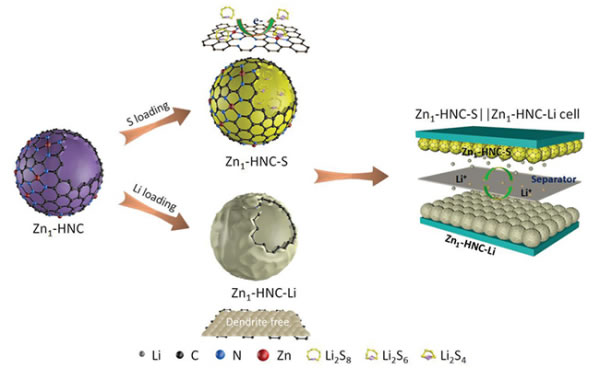Recently, the team of Wu Zhongshuai, a researcher from the State Key Laboratory of Catalysis Fundamentals, Dalian Institute of Chemical Physics, Chinese Academy of Sciences, and Yang Qihua, a researcher from the Organic-Inorganic Hybrid Materials Research Group, teamed up to develop a monoatomic zinc modification Hollow carbon ball nanoreactor. The reactor can be used as the substrate for the positive and negative electrodes of lithium-sulfur batteries at the same time to improve the catalytic activity of polysulfides and inhibit the growth of dendrites of lithium negative electrodes. The high specific energy lithium-sulfur full battery using this reactor has high loading capacity, The nature of high magnification and long cycle.
Lithium-sulfur battery has a higher theoretical energy density (2600Wh/kg) and specific capacity (1675mAh/g), and is considered as a potential next-generation high-energy density electrochemical energy storage technology. However, the shuttle effect of the positive electrode polysulfide, the slow conversion kinetics, and the growth of lithium dendrites in the negative electrode lead to low capacity, low safety performance, and poor cycle stability of lithium-sulfur batteries, which limit its commercial development. Therefore, the design of a lithium-sulfur full battery with light weight, high conductivity, high catalytic activity, excellent lithium-philic sites, and high mechanical strength, while inhibiting polysulfide shuttles and metallic lithium dendrites, is a breakthrough in lithium An effective method for the application bottleneck of sulfur batteries.
The research aimed at the problems and key technical bottlenecks encountered in lithium-sulfur batteries, combined with Wu Zhongshuai’s team in high-performance lithium-sulfur battery systems and Yang Qihua’s research in high-efficiency nanoreactor catalytic systems, and developed atomic-scale, monoatomic zinc modifications. Hollow carbon shell nanoreactor. The reactor has a high specific surface area, a multi-stage pore structure, a good lithium-philic metal surface, and excellent catalytic activity. Applying it to the positive and negative electrodes of lithium-sulfur batteries at the same time improves the ability of the positive electrode to absorb and catalyze the conversion of polysulfides, and inhibits the growth of lithium dendrites in the negative electrode. The battery has a capacity decay rate of only 0.015% under the condition of 700 cycles of long cycles; under the condition of high current density, it still has a specific capacity of 989mAh/g. The design strategy of this hollow carbon shell nanoreactor provides a reference for the design of high-energy density energy devices such as lithium-sulfur batteries based on conversion reactions.
Related research results were published on "Advanced Energy Materials". The research work has been funded by the National Key Research and Development Program and the Institute of Clean Energy Innovation of the Chinese Academy of Sciences.

Dalian Institute of Chemical Technology has developed a single-atom modified nanoreactor and used it for high-performance lithium-sulfur batteries
KN95 Face Mask,Disposable KN95 Masks,95% Filtration Mask,KN95 Civil Mask
Ningbo Jiashang textile co., LTD., , https://www.cn-jshang.com